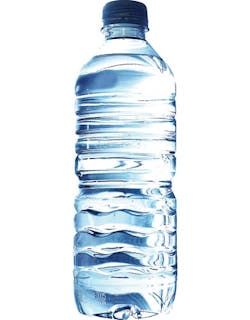Study Confirms College Bottled Water Bans Increase Consumption Of Less-Healthy Drinks
Alexandria, VA – New research published in the American Journal of Public Health (AJPH) has confirmed the International Bottled Water Association’s (IBWA) position that efforts to ban or restrict the sale of bottled can lead to increased consumption of less healthy beverages and plastic waste.
The study: “The Unintended Consequences of Changes in Beverage Options and the Removal of Bottled Water on a University Campus,” published this month in AJPH, concluded that the bottled water sales ban at the University of Vermont (UVM) resulted in a significant increase (25 percent) in the consumption of sugary drinks and an increase (8.5 percent) in the amount of plastic bottles entering the waste stream.
Research shows when bottled water is not available in a vending machine, people choose other packaged beverages, which may contain sugar, caffeine, and other additives. They don’t necessarily go looking for a drinking water fountain. The results of the new UVM bottled water sales ban study supports that conclusion.
“The data show that per capita shipments of bottles, calories, sugars, and added sugars increased significantly when bottled water was removed. Shipments of healthy beverages declined significantly, whereas shipments of less healthy beverages increased significantly. As bottled water sales dropped to zero, sales of sugar-free beverages and sugar-sweetened beverages increased,” said Chris Hogan, Vice President of Communications for the International Bottled Water Association (IBWA).
“The purpose of the bottled water sales ban was to encourage students to carry reusable water bottles that could be filled with tap water. That did not happen. The study found that the increase in sugar-sweetened beverage consumption occurred even with the university’s efforts to encourage water fountain use — retrofitting 68 water fountains so that reusable water bottles could be used and educational campaigns to inform consumers and handing out free reusable water bottles at campus events.”
IBWA has always believed that sales bans would result in increased sugary drink consumption but now the organization has a study that demonstrates these negative results can occur. In addition, since this new research has been made public, IBWA has noted an increase in social media posts indicating that results similar to those at UVM are occurring at other colleges and universities that have imposed similar sales bans.
“These bans are a misguided attempt to deal with a waste issue that would be better addressed through efforts to increase the recycling rates of all packaged drinks,” said Hogan. “Bottled water containers are the most highly recycled containers in curbside programs, and data derived from EPA figures demonstrates that plastic water bottles make up less than one-third of one percent of the U.S. waste stream. So, getting rid of bottled water on campus will not make a significant improvement to waste issues.”
Bottled water companies also use a very small amount of water when measured against almost any other industry, are dedicated to responsibly protecting and preserving our vital water resources, and helping people live healthier lives. “Sustainable water sources are the single most important aspect of our business. Water resource management, therefore, is a priority for the bottled water industry.
Even with continuing growth and increased consumption, bottled water still has the smallest water and energy use footprint of any packaged beverage. The results of a 2014 IBWA study conducted by the Antea Group show that the amount of water used to produce bottled water products in North America is less than all other types of packaged beverages. On average, only 1.32 liters of water (including the liter of water consumed) is used to produce one liter of finished bottled water,” said Hogan.
UVM also requires concessioners and vending machines on campus to maintain a 30 percent ‘healthy beverage’ ratio. “This sends contradictory and confusing message to its students when you’ve removed bottled water as a packaged beverage option,” said Hogan.
The decision also restricts freedom of choice for students to choose to drink one of the healthiest beverages available in vending machines.
“The university has failed to understand that bottled water is considered by many people to be an alternative to other packaged drinks, which are often less healthy, but it is not necessarily an alternative to tap water,” said Hogan.
“I would encourage students and schools, if they want to make a real difference for the environment, to focus their efforts of improving recycling rates of all beverages, not single out one the healthiest drinks on the shelf.”
“Telling students that they cannot buy bottled water is a step backwards, especially with the growing rates of obesity and diabetes in the U.S.”
To obtain a copy of the AJPH study, which is published in the current edition, please click here.
More information about bottled water can be found at www.bottledwater.org.





